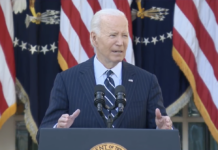
(GA Recorder) — Lawmakers grilled Secretary of State Brad Raffensperger over QR codes on paper ballots, but Raffensperger said it’s not feasible to change the system ahead of this year’s elections.
“We provided the cost in the budget for using QR code readers,” he said. “If you actually wanted to move to an entirely different system, then you would have to work up a budget for that. But as it is right now, we are feverishly building ballots for the presidential primary. We’re ballot building for all 2,500 precincts throughout the state of Georgia, and that is for the presidential primary, March 12, so it’s right around the bend.”
The last time the state implemented such a change, it took around ten months to a year to implement, Raffensperger said.
Raffensperger has taken flack from some of his fellow Republicans since shortly after the 2020 election when then-President Donald Trump named the secretary as a co-conspirator in his unfounded claims of election interference. Raffensperger famously declined to “find” enough votes to secure a Trump win in Georgia.
Demonstrators with signs calling for paper ballots have been meeting up at the Capitol since this year’s session began early this month.
House Speaker Jon Burns signaled his support for removing QR codes at an annual legislative breakfast last week.
Alpharetta Republican Sen. Brandon Beach said the Senate is ready for action too.
“We’ve been talking about getting rid of the QR codes for a long time. We had an ethics committee meeting with Chairman (Max) Burns,” he said. “We don’t need legislation. Just do it, and let us get the scanners for you. How many scanners would you need? What would the cost be? And let’s just do it. We’ve talked about it and in our committee meeting, every one of our committee members said their citizens do not trust the QR code.”
An Atlanta Journal-Constitution open records request turned up secretary of state’s office documents putting a price tag of $32.5 million for GOP lawmakers’ proposed ballot security measures, including removing ballot bar codes.
In his presentation, Raffensperger made several requests that were not in the budget proposal approved by Gov. Brian Kemp, including hiring new staff focused on election security, security measures to prepare for the upcoming election and new software for corporate filing.
As Raffensperger prepared to leave, committee co-chair Sen. Blake Tillery reminded the secretary of those requests.
“I want to highlight one thing for you,” Tillery said. “You’ve heard from the comments today. You know that the governor does the first review of the budget. If I’m adding up your sheet, it’s about $30 million more than … cleared the governor’s request. And the only thing I want to highlight for you, you heard from this room that the number one issue is removal of the QR codes, and this doesn’t do that yet.”
To which Raffensperger said: “And the Legislature would fund the budget, and so if you believe additional financial resources (are available), I believe you have those numbers. If not, I’ll make sure we get those to you tomorrow.”







